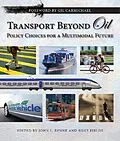Seventy percent of the oil America uses each year goes to transportation. In Transport Beyond Oil, leading experts show how to slash that statistic and reduce our dependence on fossil fuels.
The authors demonstrate that smarter development and land-use decisions, paired with better transportation systems, can dramatically lower energy consumption. John Renne calculates how oil can be saved through a future with more transit-oriented development. Petra Todorovitch examines the promise of high-speed rail. Peter Newman envisions 100% oil-free cities through the development of electric-transit, renewable natural gas, and other sustainable energy sources. Additional topics include funding transit, freight transport, and nonmotorized transportation systems. Each chapter provides policy prescriptions and their measurable results.
Transport Beyond Oil delivers practical solutions, based on quantitative data. This fact-based approach offers a new vision of travel that is both transformational and achievable.
Autorentext
Dr. Renne has extensive experience in the intersection of transportation and land use policy. He served as a principal investigator on transit-oriented development (TOD) projects for the New Jersey Department of Transportation, the Transportation Research Board, and the State of Western Australia's Department for Planning and Infrastructure. He was co-editor of Transit-Oriented Development: Making It Happen (2009). He is an Assistant Professor of Urban Planning and Transportation Studies and is Director of the University of New Orleans Transportation Studies program. Dr. Renne serves as the Chair of Research for the American Planning Association's Transportation Planning Division and the Secretary of the Transportation Research Board's Transportation and Land Development Committee. He is also the Managing Director of The TOD Group, LLC, a private development firm building a TOD in Denver, Colorado.Dr. Fields is an expert in active transportation policies serving on the Transportation Research Board's Bicycle Committee and previously serving as the Director of Research for the Rails-to-Trails Conservancy in Washington. He was the Associate Director of the Gulf Coast Center for Evacuation and Transportation Resiliency and the Director of the Center for Urban and Public Affairs at the University of New Orleans. Dr. Fields serves as PI on local and national studies of active transportation. He is now an Assistant Professor of Political Science at Texas State University. His research focuses on understanding the key elements of resilient communities. He has examined resiliency from transportation, urban planning, and hazard mitigation perspectives through positions as the Director of Research at Rails-to-Trails Conservancy in Washington, DC and most recently as the Director of the Center of Urban and Public Affairs at the University of New Orleans. Recent publications from Dr. Fields have appeared in the Journal of Public Health Policy, the Journal of Urban Design, and Cityscape. Dr. Fields holds a B.A. from Trinity University and MPA and PhD from the University of New Orleans.
Inhalt
Foreword: Where Have We Come From? Where Are We Going?
Gilbert E. Carmichael
Acknowledgments
Introduction: Moving from Disaster to Opportunity: Transitioning the Transportation Sector from Oil Dependence
John L. Renne and Billy Fields
Part 1: Petroleum Consumption Impacts and Trends
1. The Role of Transportation in Climate Disruption
Deborah Gordon and David Burwell
2. Oil Vulnerability in the American City
Neil Sipe and Jago Dodson
3. Full Cost Analysis of Petroleum Consumption
Todd Litman
4. How Does Induced Travel Affect Sustainable Transportation Policy?
Robert B. Noland and Christopher S. Hanson
5. Bending the Curve: How Reshaping US Transportation Can Influence Carbon Demand
Deron Lovaas and Joanne R. Potter
Part 2: Transportation and Oil Dependence: A Modal Analysis
6. Public Transportation as a Solution to Oil Dependence
Bradley W. Lane
7. Taking the Car Out of Carbon: Mass Transit and Emission Avoidance
Projjal K. Dutta
8. High-Speed Rail and Reducing Oil Dependence
Petra Todorovich and Edward Burgess
9. The Challenges and Benefits of Using Biodiesel in Freight Railways
Simon McDonnell and Jie (Jane) Lin
10. Healthy, Oil-Free Transportation: The Role of Walking and Bicycling in Reducing Oil Dependence
Kevin Mills, JD
11. Building an Optimized Freight Transportation System
Alan S. Drake
Part 3: Moving Forward
12. Imagining a Future Without Oil for Car-Dependent Cities and Regions
Peter Newman
13. The Pent-Up Demand for Transit-Oriented Development and Its Role in Reducing Oil Dependence
John L. Renne
14. Deteriorating or Improving?: Transport Sustainability Trends in Global Metropolitan Areas
Jeffrey Kenworthy
15. Policy Implications of the Nonmotorized Transportation Pilot Program: Redefining the Transportation Solution
Billy Fields and Tony Hull
16. From Potential to Practice: Building a National Policy Framework for Transportation Oil Reduction
Billy Fields, John L. Renne, and Kevin Mills
About the Contributors
Index.
